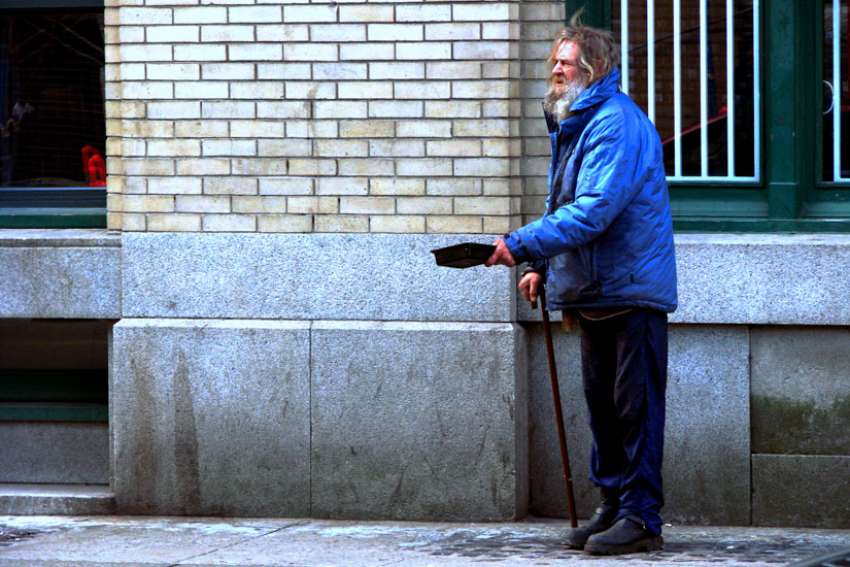Canada’s economy annually produces $1.6 trillion worth of goods and services. On a per capita basis, Canada ranks 10th among all nations in economic output. In 2014, our per person GDP (gross domestic product) was $56,076.52. But one in seven Canadians, 4.9 million of us, live in poverty, according to a review of 2015 tax data by the Christian, ecumenical policy think tank Citizens for Public Justice.
If you doubt the statistics, just take a walk, Ayesha Valliani recommends.
“You only have to walk through the streets of Yorkville on a Friday night,” said the researcher for the United Nations Special Rapporteur for Freedom of Religion and Belief and the British Foreign and Commonwealth Office. “You can see cars that you can’t drive around in the city because they’re so expensive, so absurd and cost over $1 million. And a homeless person sleeping beside that car.”
What role can people of faith play in closing that income gap? Finding answers to that question is what drove Valliani, a Muslim, to work with people of other faiths in setting up a multi-faith symposium on basic income at St. Michael’s College last month.
It was a close look at an old idea — that every citizen should have enough money for necessities and a dignified life. The symposium was the brain-child of Christian-Jewish Dialogue of Toronto. They brought together politicians, business leaders, social workers, theologians and poor people themselves to talk about ways of ensuring that all Canadians have the basics.
“Those of us from Judeo-Christian backgrounds, such as myself, seem to have lost our way in being able to translate our faith into more meaningful action to support the most vulnerable in our society,” Catholic real estate investor David Walsh told the conference. “The culture of individualism and secularism dominates our lives.”
Walsh is dismayed by knee-jerk reaction from businesses against any new taxes or innovation in social policy.
“Business seems to be brain dead as far as a lot of these issues go,” said Walsh.
Conferences on basic income have become a growth industry in recent years. The Ontario government committed to running a pilot program on basic income in its 2016 budget, with the expectation that it will begin in 2017.
It’s not a new idea. In the first Pierre Trudeau government, the Prime Minister’s principal secretary, Marc Lalonde, talked up a Guaranteed Annual Income in 1970. The “Mincome” pilot was run in Dauphin and Winnipeg, Man., from 1974 to 1979, but lost momentum with the changes in government and policy. Conservative, libertarian economist Milton Friedman proposed a guaranteed income as early as 1962.
From Brazil to Finland, at least half-a-dozen countries are experimenting with variations on the basic income idea.
The union-funded economic think tank Canadian Centre for Policy Alternatives believes that, depending on how the system is designed, anywhere from $49 billion to $177 billion a year in new spending could wipe out poverty in Canada. This isn’t money to be derived from efficiencies. It would mean double-digit tax increases.
The sticking point is the idea that basic income would mean giving some people money for nothing while the rest of us go to work everyday. In Switzerland earlier this year voters rejected a basic income proposal by a whopping 77-per-cent majority.
Basic income systems already exist for certain groups of Canadians. The Canada Child Benefit amounts to a guaranteed basic income for children under 18. Just by filling in a tax form, Canadian seniors receive the Guaranteed Income Supplement. But in between all we’ve got is welfare.
Social workers spend their days navigating the maze of social assistance restrictions and programs. Michael Fullan, executive director of Catholic Charities, says social work could be much more than a bureaucratic paper chase if there was a straightforward, basic income in place.
“You would be dealing with a clientele, for lack of a better word, that would come in and have some of the basic necessities of life. So that would help you to deal with some of the other kinds of issues happening in life — whether it be marriage, family, child problems. But you’re not having to deal with the abject poverty issues,” said Fullan.
Catholic Charities recently submitted a brief to the federal government urging a national housing policy. If people could be decently and reliably housed that’s half the battle, said Fullan.


